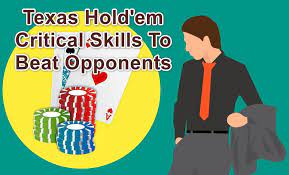Somemblers dream of making their pockets bleed with unearned income, and the Sage strategy for Texas Hold Em poker can take their hopes high. Unfortunately, as the old saying goes, if you’re not a Sage, you’re throwing money down the toilet.
Sage strategy for Texas Hold Em poker won’t be easy to learn, and won’t happen soon, probably. It’s a big leap of logic to go from theory to reality, and even then many first rate poker players fail. The main reason, if you can call it that, is that the strategy relies on you actually having a good hand. It follows then that if you are without practice, or lack the discipline to implement an unearned income, you are destined for failure.
If you are keen to make some money from poker, you could proffering one of the following strategies which need practice before they work.
Strategies That Need Practice -limitations on liabilities.
If you learn to be disciplined and use your stud agen togel strategy without being mainly focused on hand strength, you will have a big edge over the majority of players on the table. The fault lies mainly in pre-flop play, where many players have got to tight to survive in the early stages of a stud poker tournament. You should liminate or reduce your liable in hand on your blind, and ideally fold when you have poor cards.
However, the danger point comes when the opponents tighten up on you after you limp in, because then you will likely increase your pre-flop raise when you have good cards, and unfortunately for you, they will usually fold.
Strategies That Need Practice -quarterbacks and more.
If you consider limping from under the gun to be playing a weak hand, then going one step further and performing a blind steal is the strategy of choice.
Why do you do this? Well you are attempting to make a weak hand from the blind, by which your opponents might not even notice that you are playing a marginal game.
This happens to be the ultimate low risk strategy for Texas Hold Em.
Strategies That Need Practice -standard blinds.
For the more advanced players, an advanced blind strategy might involve a little more than just sitting back and waiting for good cards. You’ll need to get into a position to where you are doubling or tripling the blind from the normal amount.
Using this strategy of the steal, you really want to try to isolate a smaller stack from the blind. You don’t want to let a single stack through, because that can allow you to isolate with a wider range of cards. Instead, you want to bring a little danger to your steal, so that you don’t get picked off.
Of course, if you pay attention to the type of opponents coming into the pot, you can group them into two categories. The first category is the half-hearted types, the ones that will bet, call, or raise with any cards. The second category, the real dangers, the ones that will fold unless they have a monster.
Once you’re in such a danger, you might actually want to fold the hand, because your risk/reward ratio isn’t good enough. If you call and lose, you haven’t really invested any chips into the pot, and if you push you lose more than your original bets. Folding is a chance to cut your losses, and this is money you can more than afford to lose, especially against better players.
Strategies That Need Practice -setting field goals.
Not all players who are making a living out of poker are aware of this, or even want to. However, they all know that they are competitors, that the best players are constantly improving their skills and taking their game to the next level. They know that improvement is possible, and that if they were to end up at the last table as winners, they would make a lot of money.
While reading books by the best players of the world may help, sessions with the best poker players, especially online, will enable you to take your game to the next level. ending your day just as a mediocre player and having a bad day in poker is the reason many players get into tournaments.
Poker is a game of statistics, probability, psychology, patience, and discipline. Why, then, do we play? Why do we spend countless hours practicing? There are some answers to this question that can make understanding poker pretty straight forward.
First of all, we get into the sometimes tunnel vision of wanting to be the best or thinking we can beat the best. Maybe this is a result of success and success often seems like luck to many of us.
